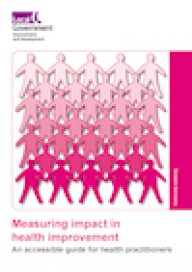Publications
 We author and publish a range of resources to keep you up to date with the latest developments in employment, labour market and human resource policy and practice.
We author and publish a range of resources to keep you up to date with the latest developments in employment, labour market and human resource policy and practice.
All our pdf publications are free to access.
-
📄
Achieving Change Using the Supply Chain Model in Construction
Wilson S, Tyers C | Feb 2011 | Health and Safety Executive (HSE)The Health and Safety Executive has been working in partnership with the construction industry since the 1990s to bring about improvements in risk management by developing solutions together. One aspect of this is an initiative called the supply chain model, which attempts to take a cohesive approach by drawing together stakeholders from across the construction industry, such as suppliers, contractors, clients (from both the public and private sectors) and designers/architects. In 2009 HSE commissioned the Institute for Employment Studies to undertake a qualitative evaluation of the supply chain initiative and its component work strands. This report presents the evaluation’s findings.
-

Measuring impact in health improvement
An accessible guide for health practitioners
Garrow V | Feb 2011 | Improvement and Development Agency (IDeA)This guide has been developed for practitioners working for councils and public health organisations evaluating the impact of a project or initiative. It will take you through the process of designing, implementing and disseminating an impact assessment and will also provide information on the range of tools and help that is available. It aims to be a practical guide, helping you to design and conduct effective and appropriate impact assessment.
-
📄
Activity Agreement Pilots - trialling different approaches to re-engaging young people not in education, employment or training (NEET)
Evaluation of the 2009-10 extension
Maguire S, Newton B, with Fearn H, Oakley J, Williams C, Miller L, Levesley T | Feb 2011 | Department for Children, Schools and Families (DCSF)Activity Agreements (AA) were piloted in eight areas of England between April 2006 and March 2011 and were designed to help re-engage young people (aged 16 or 17) not in employment, education or training (NEET). This report evaluates the final 12-month extended period of these pilots (known as Pilot 3).
-
📄
Developing an Outstanding Evidence Base to Support Regional Skills Activity
Cox et al. | Jan 2011 | South East England Development AgencyThis report, analysing the demand for skill in the South East was produced by SEEDA in collaboration with the Institute of Employment Studies, during the summer of 2010. This publication is no longer available from the client.
-

IES Annual Review of the HR Year Ahead 2011
From restructuring to rebuilding
Dec 2010 | Institute for Employment StudiesTwo perspectives are addressed in this review of where HR is going in 2011 by thirteen of IES's HR researchers. In the first, we consider the recent experiences and research on restructuring organisations and the critical role of leadership in doing this successfully. In the second, we consider more specific ways in which organisations are rebuilding morale and performance in their workforce as they emerge from recession and cost cutting.
-

European Restructuring Monitor Quarterly - 2010, Issue 4
Hurley J, Riso S, Salvatore L, Miginis M, Broughton A | Dec 2010 | European Foundation for the Improvement of Living and Working ConditionsSovereign debt issues dominated the agenda in the final quarter of 2010 as a second EU Member State, Ireland, required EU-IMF intervention in November to stave off default. Given similar concerns in other Member States a focus on the health of the euro and on individual government deficits and access to market funding was expected to continue throughout 2011.
-

West London HR Consortium: Report of learning set on HR communication and integration
Hirsh W, Reilly P | Dec 2010 | Capital AmbitionFollowing on from research by the Institute for Employment Studies on What Customers Want from HR and a series of workshops run for London Councils during 2009, two strong themes emerged: how the HR function facilitates effective people management and how it relates to its internal customers: senior managers, line managers and employees. These questions became more pertinent during the course of the project as Councils were operating in an environment where serious cost reductions were required and the HR function had to identify how it caould best support a period of challenging change as well as addressing various HR issues within the function.
-

Perspectives and Performance of Investors in People
A Literature Review
Gloster R, Sumption F, Higgins T, Cox A, Jones R | Dec 2010 | UK Commission for Employment and SkillsIn April 2010, the UK Commission took over strategic ownership of the Investors in People (IIP) Standard. This evidence review draws on a wide range of research from the previous ten years to develop a deeper understanding of how IIP is perceived and to provide evidence of the impact of the Standard on the businesses that are accredited. The review provided the UK Commission with a consistent narrative on IIP to date.
-

Using Jobcentre Plus Services: Qualitative evidence from ethnic minority customers
Marangozov R, Bellis A, Barnes H | Nov 2010 | Department for Work and Pensions (DWP)This research explored the experiences of ethnic minority customers using Jobcentre Plus services to identify any specific issues and how these might usefully be addressed. The research involved 83 in-depth, face-to-face interviews with Jobcentre Plus customers in four locations across England. Customers were from Bangladeshi, Pakistani, Indian, Chinese, black Caribbean, black African, ‘Mixed’ and ‘Other’ ethnic backgrounds. White British customers were also included to explore whether the experiences reported were typical of the entire population sampled or unique to specific ethnic groups.
-

Employment and Support Allowance: Customer and Staff experiences of the face-to-face Work Capability Assessment and Work-Focused Health-Related Assessment
Barnes H, Aston J, Williams C | Nov 2010 | Department for Work and PensionsThis report presents findings from qualitative research on the Work Capability Assessment (WCA) and Work-Focused Health-Related Assessment (WFHRA). The research was carried out in spring/summer 2010 and included Employment and Support Allowance customers, Jobcentre Plus and Pathways to Work Provider Personal Advisers, and Atos Healthcare staff working on these assessments.
